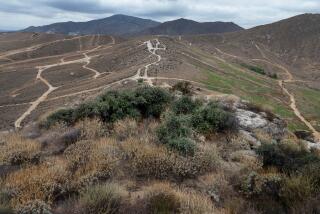Just in time, the Oak of the Golden Dreams has found an advocate.
An ancient oak tree marks the spot in Placerita Canyon on the northern rim of the San Fernando Valley where gold was first discovered in California.
Perhaps it was shortsighted of California officials when they designated a living thing to commemorate, in perpetuity, this event in the state’s history.
Fifty years after it was christened, the Oak of the Golden Dream it is growing old and sick.
Once a ponderous specimen of the coast live oak, with five strong limbs protruding at angles from a massive curving trunk, it is now reduced by weather and vandals to twin vertical limbs rising from a hollow deformity of a base.
A naturalist would have no trouble declaring the tree ripe for replacement by one of the saplings around it.
But, just in time, the Oak of the Golden Dream has found an advocate in Lorrin Peterson of Valencia. Peterson, a 66-year-old manager of communications-systems programs for Litton Data Systems, said he has no intention of retiring, ever, though he may give it another thought at 75.
He sees no reason why the Oak of the Golden Dream should be abandoned just because it’s old.
Peterson met me Tuesday at Placerita Canyon Park, home of the oak. Appointment book and tape measure in hand, and dressed in well-cut slacks and a summer jacket, he strode briskly down the half-mile concrete walk to the oak, talking with a Rotary Club zeal about his conversion to the cause of a single tree.
“About two years ago, I noticed that it was really deteriorating,” he said.
The main trunk, though still intact, sagged toward the ground, hollow and punctured with openings where old limbs had died and rotted away. Dirt, raised above its natural level by the 1950s excavation for the Placerita Canyon Road, was being packed down on its roots by sightseers. Borers were cutting into the living limbs. Dead branches obstructed the growth of new shoots. Vandals had left their marks in its bark.
This pathetic sight wounded Peterson’s community pride.
“I came to the people here in the park and said, ‘You really ought to do something about it,’ ” he said. “They said, ‘We don’t have any money for it.’ ”
Peterson accepted the explanation, but not its conclusion.
He and two friends formed the Society for the Restoration and Preservation of the Oak of the Golden Dream, each contributing $100.
As it turned out, Peterson isn’t happy with the Newhall Rotary, which he said uses the Oak of the Golden Dream as its logo but hasn’t yet chipped in.
“They take a lot of pride in this place and talk about it a lot, but they don’t do much to support it or take care of it,” he said.
Peterson said he believes the tree is 500 years old, even if some doubt it. Although the trunk is too eroded to date by its rings, he gives weight to testimony that the tree was already old early in the century. That comes from Melba Fisher, one of 10 children of the Walker family that once owned the property. She played in the tree when she was a girl.
“She said they used to climb inside the trunk and jump out on the ground even then, which must have been about 60 years ago,” he said.
The trail to the oak followed a creek bed through a passage under Placerita Canyon Road. The concrete walls are painted with bright murals. One shows the canyon wildlife. Another portrays herdsman Francisco Lopez discovering gold flakes on the roots of wild onions he picked near the tree in 1842.
The murals are more impressive than the oak itself, just on the other side.
“God, it sure doesn’t look very healthy this morning,” Peterson said.
Even since Peterson came to its aid, the tree has declined. Last year, a portion of the rotting trunk severed and crashed to the ground, damaging a split-rail fence.
Peterson enlisted a tree surgeon who pruned its dead branches, sawed away the jagged edge of the fallen trunk and injected the limbs with insecticide.
What’s left may look homely, but the tree surgeon said it could live 100 years.
Peterson wants it to appear dignified for the thousands of visitors drawn each year by road signs and a notice in an auto-club guide.
“They come from foreign countries because it’s mentioned in travel brochures,” he said. “They come here, and it’s not too inspiring.”
Peterson stretched his tape measure around the broken enclosure. It measured 118 feet.
While measuring, he outlined his plans.
“I plan to get a layout so I can get bids on a fence and a monument,” he said. “Then I’ll get bids on grading it back to the original level. I’d like to bring a cement walk around the outside.”
It all could cost $5,000 to $10,000, he said.
“I need to find cheap labor until I find a rich patron,” he said.
In the meantime, he tries to keep his dream in perspective.
“Like all of us, it has a finite life,” he conceded. “It won’t live forever.”
So he’s planning to take care of the saplings too.
“If we invest too much money and it dies, we can make son of the Oak of the Golden Dream,” he said.
More to Read
Sign up for Essential California
The most important California stories and recommendations in your inbox every morning.
You may occasionally receive promotional content from the Los Angeles Times.











